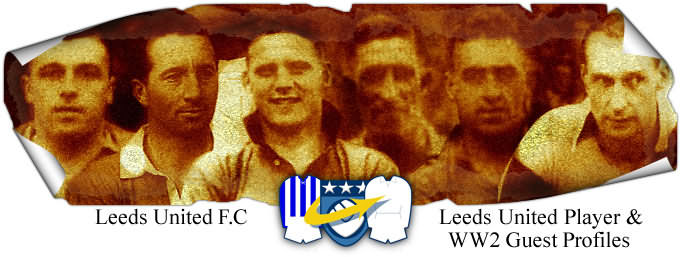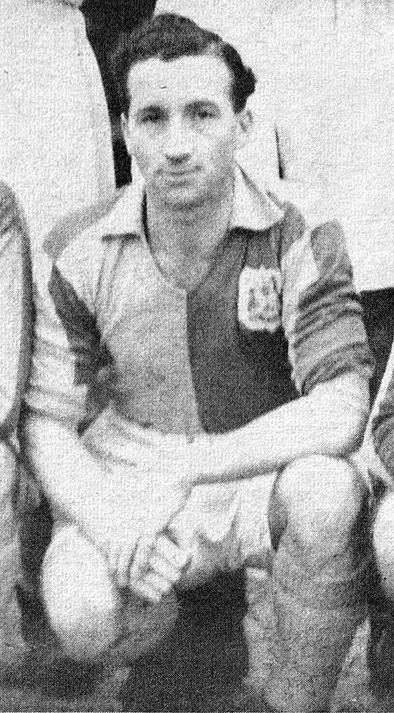

Powell: Aubrey
1935-1948
(Player Details)
(Leeds United War-time Guest Player Details)
Inside Forward
Born: Lower Cwmtwrch, Glamorgan: 19-04-1918
Debut: v Middlesbrough (h): 25-12-1936
5í5Ē 10 st 2lb (1938)
Powell started as an amateur with Cwm Wanderers and had moved on to Swansea Town but was
still on amateur forms when spotted by the Leeds United scouts and they signed him in November
1935. He made an immediate impact on his debut, a year later, but just three months after
making the first team in only his eleventh League appearance and twelfth match overall, he
sustained a broken leg in Unitedís game at Preston North End on 20th March 1937. The injury
was so severe that he was written off by the doctors and told he would never play again. It
took eighteen months, but he battled back and formed a highly effective partnership with
David Cochrane until the outbreak of war. When the Second World War caused the Football League
fixtures to be suspended he had scored six goals in thirty-nine League appearances. He served
with the East Yorkshire Regiment during the War Years but he was second only to Gerry Henry
in the number of games played for the club by an individual player. He played one hundred and
twenty-three times in League games and scored thirty-seven goals and scored one goal in three
appearances in the War Cup for Leeds in wartime games. After playing in two of the three games
Leeds played in the aborted 1939-40 Football League season, he was in the Leeds team that
played the first game of Wartime football in a 3-0 win over Bradford City at Elland Road on
28th October 1939 and scored six times in fourteen games in the Regional League North-East
Division, missing just four games, and scored once in two War Cup games. 1940-41 saw him score
three goals in fourteen appearances in the North Regional League and make one appearance in
the War Cup. In the 1941-42 Football League Northern Section (First Championship) he was
ever-present with three goals in eighteen games and he scored twice in thirteen games in the
Second Championship. He was ever-present again in the 1942-43 Football League Northern Section
(First Championship), scoring six times in eighteen games while scoring ten times in fourteen
games in the Second Championship. He scored three times in eleven games in the 1943-44 Football
League Northern Section (First Championship) and backed up with three goals in eleven games in
the Second Championship. He only made one appearance in the 1944-45 Football League Northern
Section and that was in the Second Championship and in the final Wartime season of 1945-46
Football League Northern Section he scored twice in twelve games. During the War years he had
played for Wales on four occasions. On 8th May 1943 he was at Outside Right in a 1-1 draw with
England at Ninian Park Cardiff, on 25th September 1943 he scored at Outside Right in a 3-8
defeat by England at Wembley, on 20th October 1945 he scored the winning goal from Outside
Right in a 1-0 win over England at the Hawthorns and on 4th May 1946 he played in the 0-1
loss to Northern Ireland at Ninian Park Cardiff. During the war he served in Belgium and he
became an Army PT instructor, stationed in North Yorkshire and Hull. He won his first full
official Welsh cap at Inside Right on 19th October 1946 in a 3-1 win over Scotland at the
Racecourse Ground Wrexham. This was soon followed by his second cap at Inside Right in a 0-3
defeat by England at Maine Road Manchester on 13th November 1946, his third in another 0-3
defeat to England on 18th October 1947 at Ninian Park Cardiff, his fourth, at Inside Right,
in a 2-1 win over Scotland at Hampden Park on 12th November 1947 and his fifth and final cap,
while at Leeds, at Inside Right on 4th May 1948 in a 2-0 win over Northern Ireland at the
Racecourse Ground Wrexham. Powell had been one of Unitedís few bright spots in their
relegation year of 1946-47, when they had broken many records for all the wrong reasons, but
he scored nine goals in thirty-four League games. He again shone like a beacon in the 1947-48
season as United narrowly avoided relegation into the Third Division and scored ten times in
missing just three League games. New Manager Major Buckley needed money to wheel and deal on
the transfer market and so hard-up Leeds sold him to Everton for £10,000 in June 1948, which
was the Goodison clubís record fee at that time. He made his Goodison debut in a 3-3 draw
with Newcastle United on 21st August 1948 in front of a 57,729 crowd, who were pleased to see
him make it a scoring debut. While at Everton he gain three more Welsh Caps to take his total
to eight as he was at Inside Right in a 0-1 defeat by England at Villa Park on 10th November
1948, at Inside Left in a 5-1 win over Belgium at Ninian Park Cardiff on 23rd November 1949
and he scored the Welsh goal in a 1-3 defeat by Scotland at Ninian Park Cardiff on 21st
October 1950. He scored three goals in nineteen appearances in the 1948-49 season and two
in sixteen games in 1949-50, to total five goals in thirty-five League appearances for the
Toffees in his two seasons at Goodison Park. He joined Birmingham City in August 1950,
scoring once in fifteen League appearances before going to Wellington Town, in June 1951,
where he retired in 1952 after developing severe arthritis. He returned to Leeds and later
worked for two confectionary companies until he retired at the age of sixty-five. He lived
in the City for the rest of his life and was a regular attendee at Elland Road and in the
1960ís he coached at Leeds Ashley Road. He had been in poor health for the last six months
of his life before he died in Leeds on 27th January 2009, aged ninety.